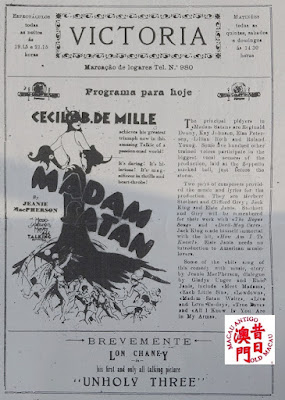Macao
By American Consul Frederick W Hinke, Canton - China
Macao is a Portuguese colony situated mainly on an island west of the mouth of the Sikiang or West River and consisting of the territories of Macao, Taipa and Coloane about 40 miles southwest from the British Crown Colony of Hong Kong and 70 miles south east from the great Chinese metropolis of Canton.
This city is the oldest European settlement in the Far East having been under Portuguese administration since 1557 a period of 374 years. In the past 10 years reclamation of waste land has increased the area of the territory from about 1,250 acres to more than 1,750. The colony at one time was the only entrepôt into China but in recent years the commerce of south China has been diverted to the neighboring British colony of Hong Kong while a number of ports have been opened up along the China coast to care for the needs of central and north China.
Some revival of commercial activity is slowly becoming apparent as native industries the fire cracker and blackwood trades in particular have been forced to seek refuge on foreign soil from the heavy burdens of taxation and civil strife in south China. For these reasons also there has been a marked growth in the population of this city which is now estimated at about 175,000. Of this number more than 80 per cent are of the Chinese race.
The Portuguese have been able however to give the city a European aspect and western ideas of amusement are prevalent. According to a report received from the inspectorate of economic services of the colony there are two motion picture theaters in Macao housed in buildings of European type.
Details regarding these two establishments are as follows:
Cinema Victoria capacity 600 American equipment used two performances every evening and three matinees weekly.
Cinema President capacity 350 uses American equipment two performances every evening and three matinees weekly.
 |
| Anúncio de 1932 (imagem não incluída na obra referida) |
As in Canton comedies and farces are particularly popular dramas only slightly less so. Films depicting western cowboy life are said to be resented especially when oriental characters are depicted in an unfavorable light or are made to appear ridiculous In general public taste in pictures is very similar to that prevailing in Canton.
The consent of the police commissioner must be obtained before films are exhibited in Macao. It is understood that films regarded as immoral or dealing with subversive activities are either prohibited altogether or are cut. Distributors of motion pictures to the Orient should be careful in the selection of films to avoid those in which oriental people are represented in a manner that might be regarded as derogatory or which contain themes of a subversive or immoral nature.
Furthermore the Portuguese authorities may be reluctant to pass films dealing with high life which shows occidentals as dissolute or vicious since such films would tend to lower their own prestige among the natives of the colony.
No sound motion picture equipment has yet been installed in Macao but the success of talking films in the neighboring cities of Hong Kong and Canton has aroused interest in the Portuguese colony as well.
The following suggestions for stimulating the demand for American films were made in a memorandum prepared by the inspectorate of economic services transmitted to this office by the Portuguese consul general at Canton in a letter dated November 4, 1930:
'It would be helpful to the development of the American motion picture trade in Macao if direct arrangements for the distribution of films could be made between American producers and the two motion picture houses now operating in Macao and it is furthermore suggested that American motion picture producers enter into an agreement with exhibition in Macao provided necessary guaranties can be arranged for a division of the net proceeds of performances given in Macao on a 50 50 basis.'
Although the distribution of American films in Canton is on a far larger scale than in Macao, representatives of American pro ducers in the Far East may find it advantageous to call upon the proprietors of existing establishments in Macao when visiting Can
ton and Hong Kong as it appears that there are possibilities for an expansion of the demand for American productions in the Portuguese colony.
ton and Hong Kong as it appears that there are possibilities for an expansion of the demand for American productions in the Portuguese colony.
Publicado em 1931 no Trade Information Bulletin, uma publicação do governo dos EUA. O artigo é da autoria do cónsul dos EUa em Cantão na época.
Sem comentários:
Enviar um comentário